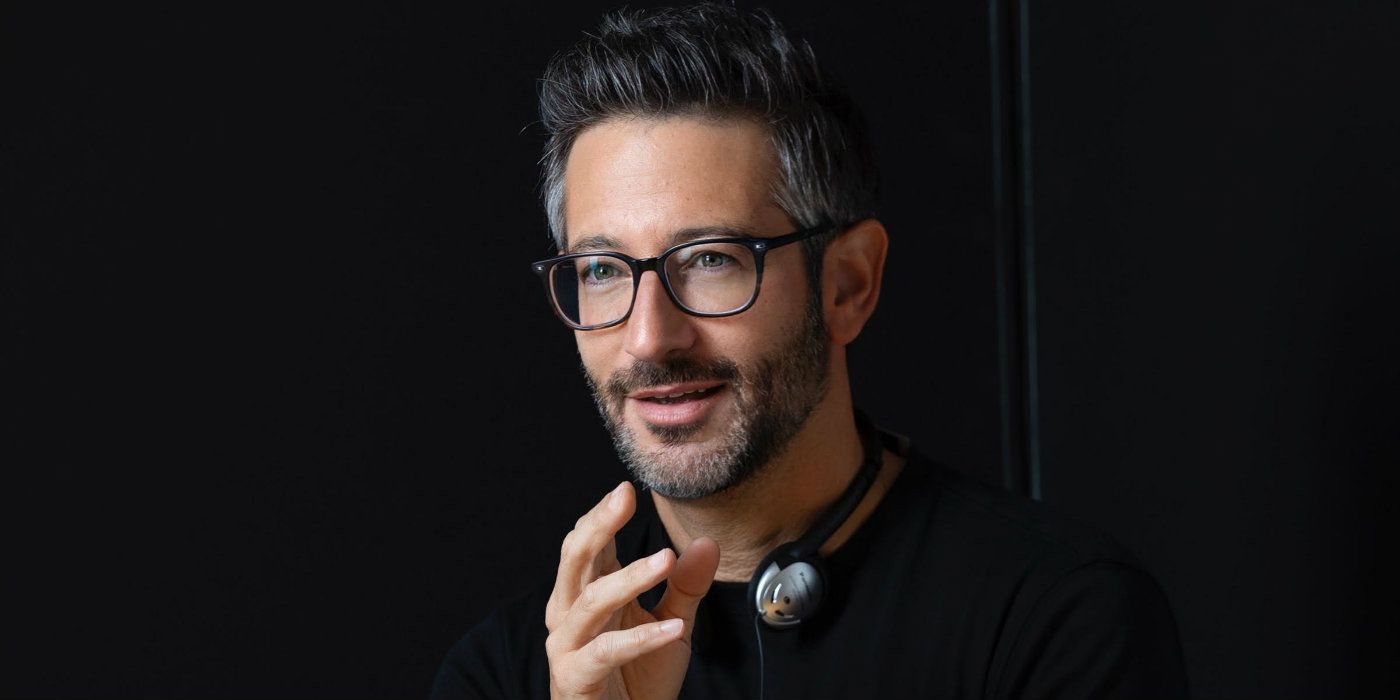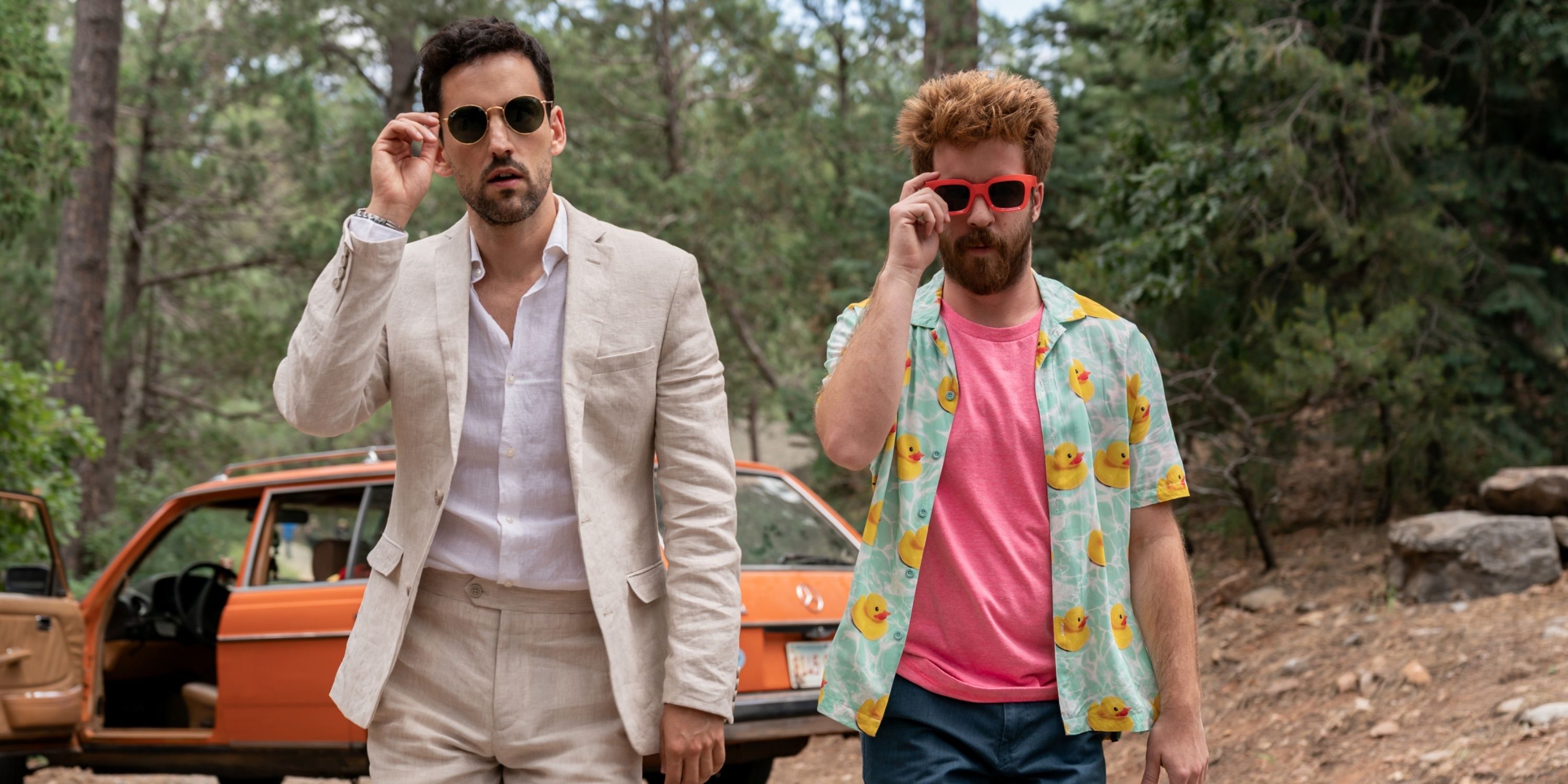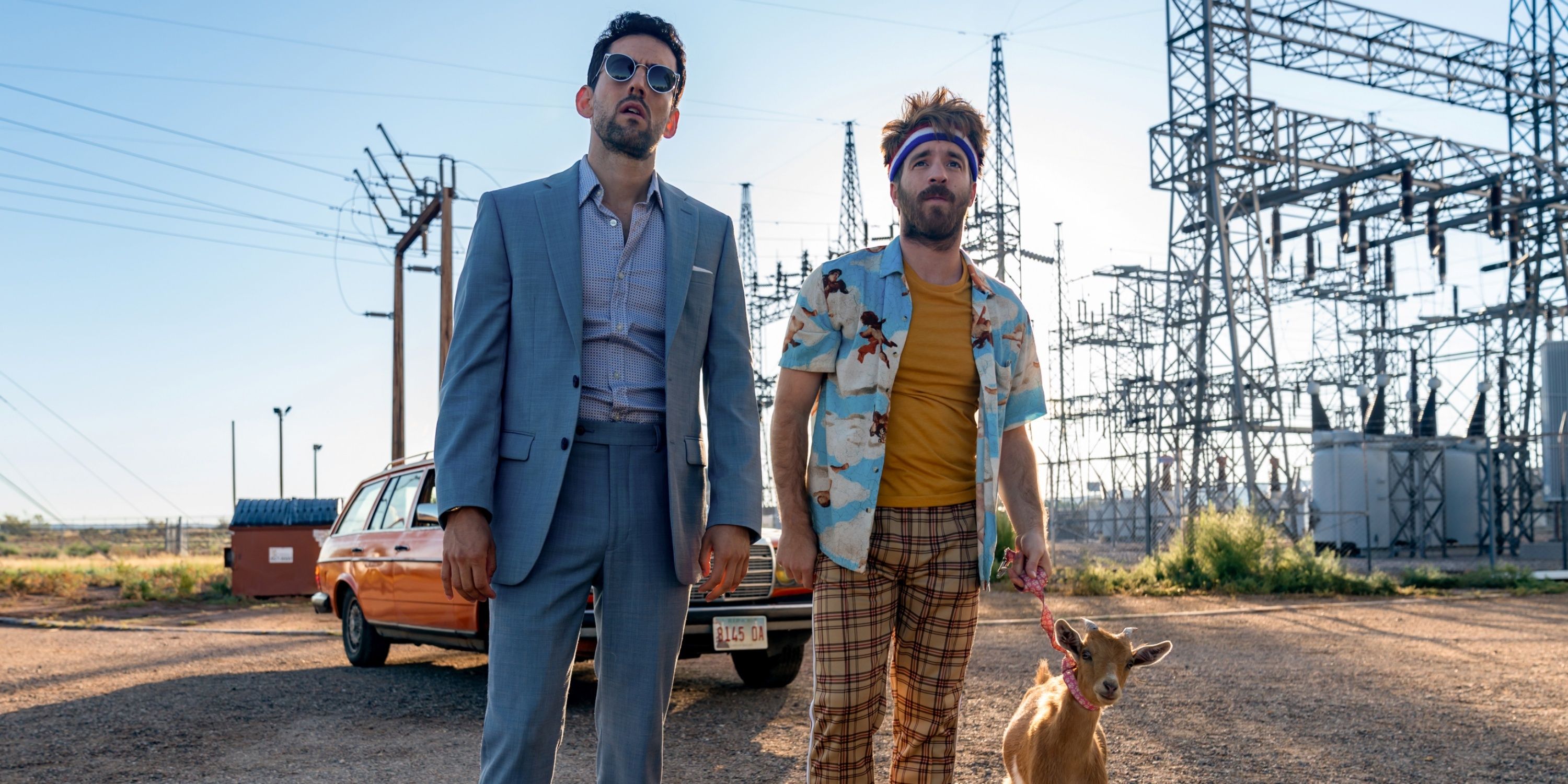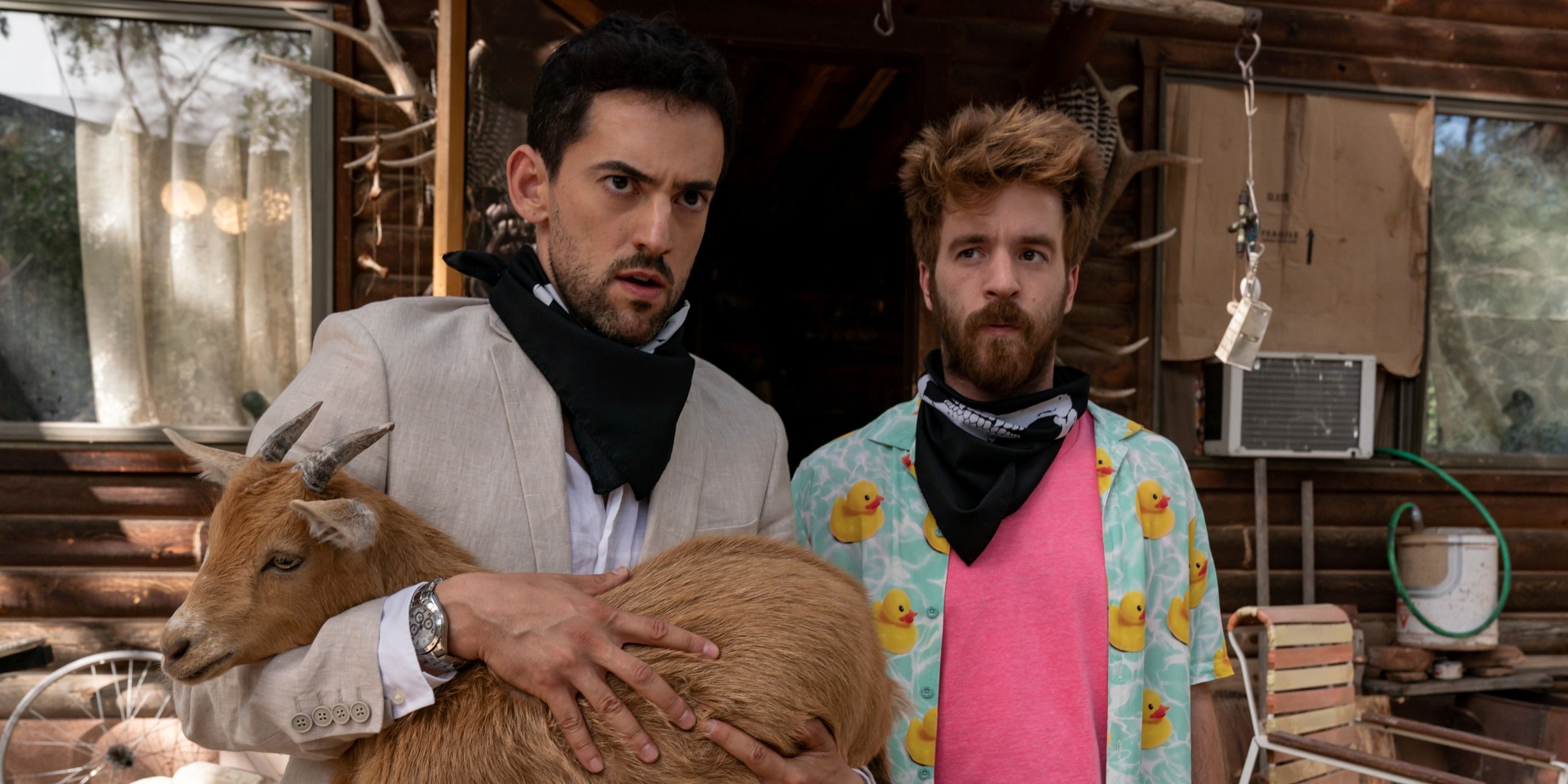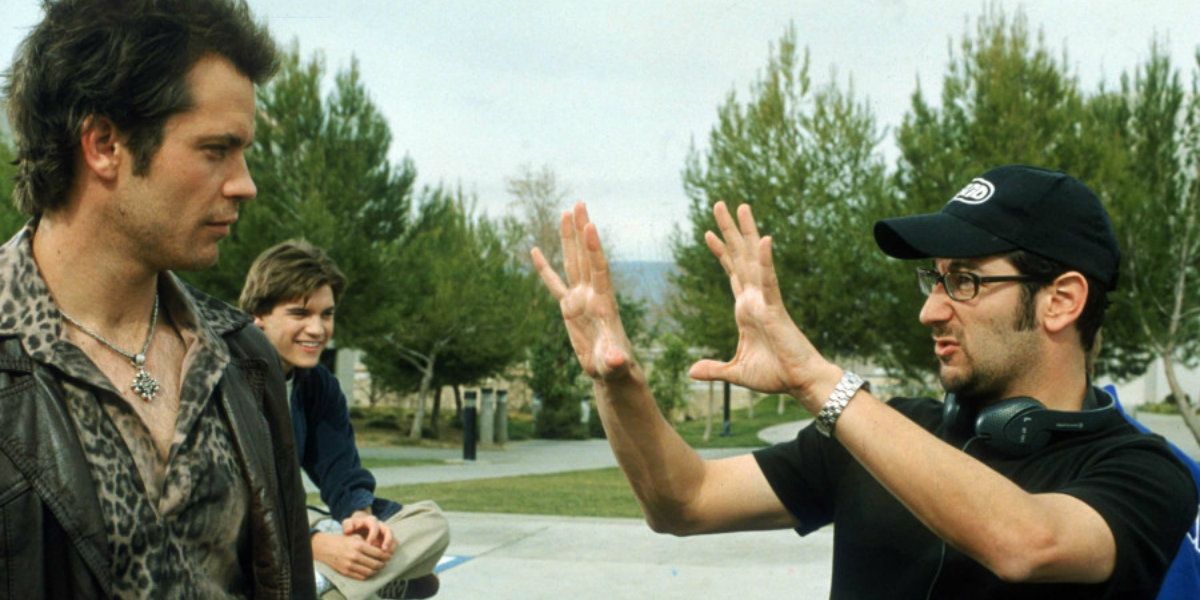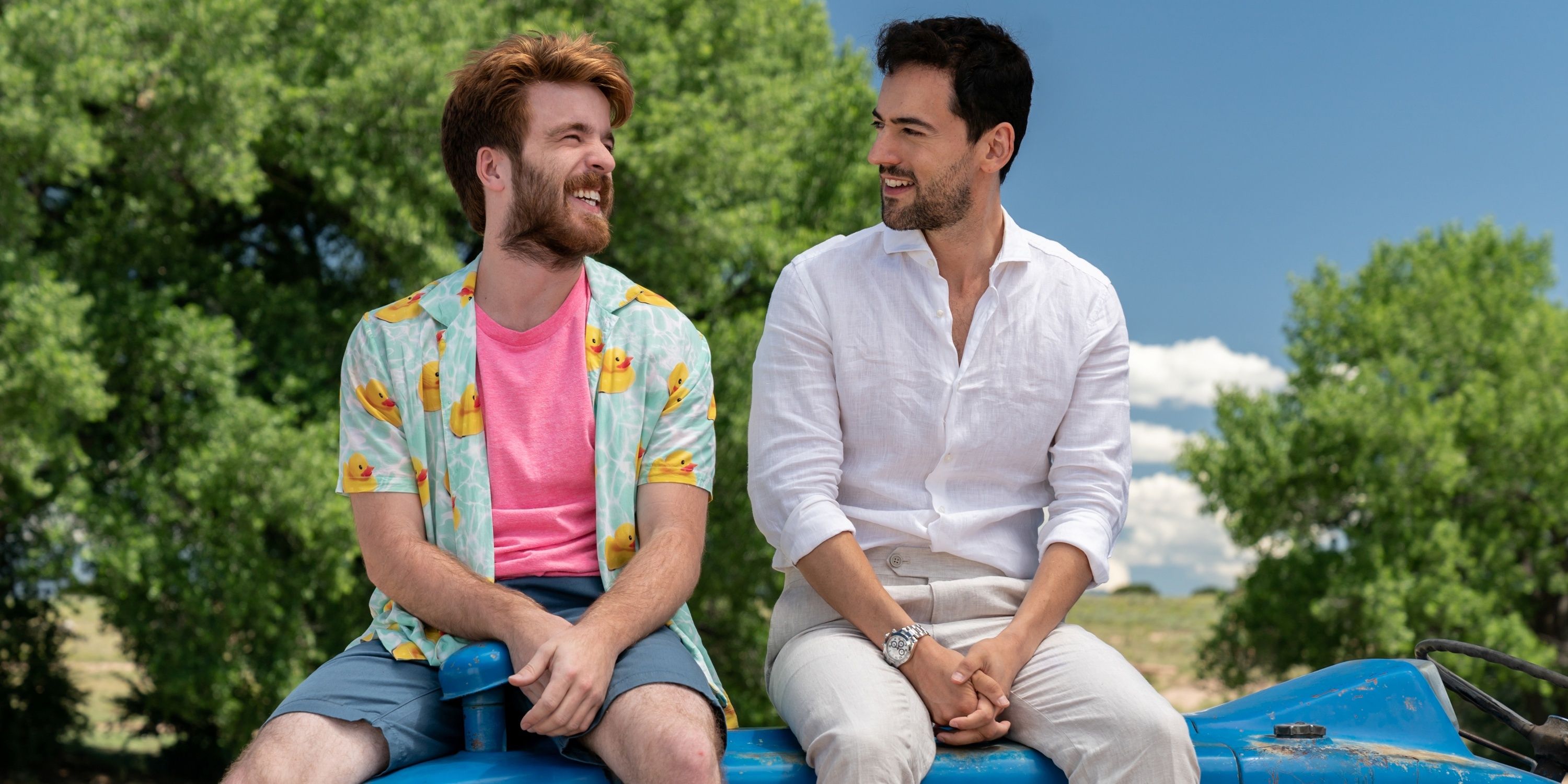Focus Features releases Half Brothers in theaters on Friday, and the dramedy -- yes, dramedy -- represents a departure of sorts for its director, Luke Greenfield, who had to dig deep into his own life for this emotional film, his first since the 2014 box office hit Let's Be Cops.
In the interest of full disclosure, I had an unpaid internship at Greenfield's Wide Awake production company more than a decade ago, so I've known the director for quite some time, though we hadn't spoken for more than a year when this interview was conducted. I wasn't even sure Greenfield would agree to an interview, but I wanted to shine a light on Half Brothers, which is a big-hearted movie that deserves a little love with so many media members focused on the Netflix release of David Fincher's Mank.
Greenfield acknowledges below that he's not on Fincher's level, but having paid close attention to his career, it's clear to me that he has matured as both a filmmaker and as a person as he enters what he calls his second chapter. And while Greenfield's future does look promising, with several projects percolating around town, it was the past that the director had to face while making Half Brothers, which isn't just about siblings, but also the often complicated relationship between fathers and sons. The emotional story forced Greenfield to finally grapple with his parents' divorce as well as his own recent divorce -- an admission that caught me off guard, but one in keeping with the revelatory truths doled out one after another in his new film.
Half Brothers stars Luis Gerardo Mendez as Renato, a buttoned-down aviation executive from Mexico who flies to Chicago to visit his dying father, Flavio (Juan Pablo Espinosa). At the hospital, he's introduced to a half-brother he has never met -- the free-spirited Asher (Connor Del Rio), who in classic buddy movie fashion is Renato's polar opposite. Flavio's dying wish is for his two sons to learn about his life by going on a road trip together, bonding along the way. Though Mendez and Del Rio get the lion's share of the screen time, Espinosa is genuinely affecting in the film's many flashbacks, which shine a light on the immigrant experience. It's not all fun and goats here.
Yes, a goat does factor into the plot, but this isn't the Due Date-like laugh fest advertised by its trailer. There's a lot of heart here, which has always been Greenfield's trademark. It's why I wanted to intern for him after seeing The Girl Next Door when I was 20 years old. Like that film, Half Brothers builds to a satisfying emotional climax that brought tears to my eyes, underlining the universality of this bilingual story, which features a significant amount of Spanish dialogue -- something that's rare for a studio movie.
Maybe it was our history together, but Greenfield seemed comfortable being candid about his career with me, so I hope you enjoy our chat below, and whether you see Half Brothers in theaters or catch up with it on VOD, I think you'll be pleasantly surprised by the way this movie balances some tricky tonal shifts en route to delivering a feel-good ending that reaffirms the meaning of family.
This is a big change of pace for you, so what made you want to step outside your comfort zone for this one?
When the script came to me, honestly, the whole reason why I wanted to make the movie was, could I do two completely different tones in one film? Could I really balance that? I like to mix genres, and the comedies that I've made are not just straight comedies, they have a lot of different elements in them, but with this one, the question was, could I do a grounded buddy comedy and then, also do a very dramatic, heartbreaking, sometimes tragic journey of a Mexican immigrant? And could I weave them back and forth throughout the movie so that I could have an audience laugh hysterically, and then very quickly cry, and then go back to laughing.
I really wanted to see if I could walk the line between those two very different tones, and make a movie -- more of a dramedy than a comedy -- that the audience could experience a number of different emotions [while watching], and make the type of film that made us want to be filmmakers back in the day, because I don't see a lot of these types of movies anymore, especially theatrically. I mean, my God. No one's wearing capes, no one's a zombie or a vampire. It's not IP. So that was the main reason why I just jumped on.
Tell me about casting Luis and Connor. Did you do a bunch of chemistry tests to make sure you had the right pairing, and was there any temptation to cast a larger name in either of these parts?
The truth of the matter is that Luis picked me. Jason Shuman, the writer and producer who I've known since film school, sent me the script and he said 'listen, the biggest movie star in Mexico wants you to direct this movie.' And I said, 'really? Who is he?' And he told me Luis' name, and I said, 'I'm so sorry, I don't even know who that is.' And he said, 'do your research. I'm telling you this guy is a big deal.'
So I watched a couple of Luis' films and then I jumped onto Skype with Luis, and I don't know if you've ever had the pleasure of meeting Luis, but he's probably one of the best human beings I think I've ever come across in my life, let alone my career. We really hit it off, and we talked about the work we wanted to do on the script to make it more personal to ourselves. I had to do something on this movie that I didn't want to do, which was to dig deep into my own personal problems with my father and my stepfather and my parents' divorce, and the divorce I'm going through right now.
I'm sorry to hear that.
We're still best friends, and we can get into that on a personal call, but with this movie, I needed to do that. I had to explore my parents' divorce and my own divorce to get that honesty and truth. So Luis was already aboard, and the big challenge was... we did a lot of work to the script, and in developing Asher, one of my biggest prototypes was Owen Wilson in Bottle Rocket and his character Dignan, and how do you find that guy today? Because that was a one-of-a-kind character. And I laugh because Luis would probably say, 'we've gotta find a fucking weirdo. We've gotta find a guy who's just fucking strange and different and weird. How are we gonna find that guy?'
So we started casting, and it's funny, because the very first self tape I saw was Connor Del Rio. He just made me laugh and he did some really interesting stuff. I think any filmmaker will tell you that it's an actor's curse when the actor is the very first person the director sees, because then it's like, 'okay, he's good, but let's start casting. Let's meet everyone.' But we kept going back to his tape, and like you said, we did a number of chemistry reads where Connor would come into the casting room or come to my house, and their chemistry was undeniable. And when Connor would leave my house, Luis and I would sit on my couch and watch the tape on my TV and we'd just start laughing. It was like, 'oh my God, he's the guy.'
And then, at our final chemistry read, Luis, who I guess is not experienced in the casting process, we were sitting there talking to Connor, who was still in an audition, and Luis said 'look, you're definitely the actor we're gonna hire, I just wanted to talk to you about blah blah blah' and I saw Connor's face and it was like, 'did this motherfucker just give me the job?' And I was like, 'did he just give him the job right there?' And then all of a sudden, Luis was like, 'oh, that was kinda weird that I just did that.' And we all just started laughing. We knew we were going to hire him anyway, but it was just an interesting way for an actor to be told he got the role. And then, did you want to hear about the casting of Juan Pablo Espinosa?
Yeah, for sure. I thought he was great.
I'll tell you something, that was a journey. Because I saw his tape and I was blown away. I'll tell you, when people read the script, a lot of friends of mine who are women read the script and they were like, 'I fucking hate this father character. I hate him. He ditches his family, he cheats on his wife, he has a new family in America. Fuck this guy. I hate this guy.' So I was like, 'wow, okay. We're gonna really need to cast an actor who can overcome the challenges on the page, who can be full of heart, and lovable, and someone you really root for.' And when I saw Juan Pablo Espinosa's tape, I was immediately hit with, 'wow, this guy's got it.He's just got it.'
The huge challenge was that Juan Pablo Espinosa is not Mexican, he's Colombian. And Eduardo Cisneros, the writer-producer, and Luis, had some big pushback, because they were like, 'we've gotta make this authentic. He's gotta be Mexican.' So we looked at tons and tons of Mexican actors, and you know me, being the filmmaker that I am, I know what I want, I know who's gonna be great, I love casting, and I was like, Juan Pablo is the guy. He's the guy.' But it was a big challenge, and I even had to say to Juan Pablo, 'listen, you're my guy, but unfortunately, you're not Mexican.' And he hated hearing that, but finally, we all agreed that Juan Pablo is Flavio. He captures him. So it was a real journey casting Juan Pablo and I think he's really gonna shine in this movie and it's really gonna make a name for him.
We live in a time where you've got people like Lulu Wang calling out Ron Howard when he says he wants to make a movie about a Chinese pianist. So what would you say to people who think a Mexican filmmaker should've directed this movie?
Listen, it's a great question, and it's a just question. It's interesting, I went into this really telling a family story, and a father-son story, and we all wanted to tell a universal story. This is definitely about a Mexican family and it is very specific. This guy grew up in San Miguel, and we did tons and tons of research, and heard people's stories to make it authentic and capture the truth of these people, especially these men who have to come to America because they want their family to survive. But I went into it the way the producers and Luis wanted me into it. Luis specifically wanted me just based on the work I had done, but listen, it's a great question. You may have to ask the producers who hired me, and Luis.
But I kind of went into this really trying to capture the emotion that we all have around our relationship with our family, and about forgiveness and about empathy. I mean, I asked the same question, and I was constantly told -- and this wasn't my quote -- that 'if Ang Lee can do a movie about two gay cowboys, you can do this.' So I took it on and said, 'look, I'm gonna make a very universal film about this Mexican family.' I want these emotions to resonate with all ethnicities and every person in the world, I'm hoping, can relate to this.
How much of this film is in Spanish, because it seemed like a lot, which is rare for a studio movie. I was thinking, jeez, could this get a Foreign Language Oscar nomination? Do you happen to have a percentage or a feel for how much of the dialogue was in Spanish?
We did a lot of work to the script. We worked on the script for a while, and I think 30% of it is in Spanish, which is exciting for me, and yeah, it's super rare [for a studio movie]. We wanted to be authentic, and this is a bilingual film. It just is. And I love what you just said, because I was super excited to open this movie like a foreign film. That was my goal with this whole movie, which begins in San Miguel and establishes this beautiful relationship between a father and his son. I was looking at Cinema Paradiso and all these movies and foreign films that captured my heart, because that was my goal. Because this movie is going to open as a foreign film, and that's what it's going to be. So it was super exciting.
I've taken a lot of Spanish. I think I took it in 6th grade all through middle school, high school and college, so I speak the language. Luis, especially in his comedic stuff, speaks very fast. I think you probably noticed that the subtitles were just flashing because he speaks so fast, but it was a great exercise for me. Because even though I worked on the script for a long time and knew the words inside and out, I was directing by the energy I got. I was directing by their eyes and their facial expressions, and that's how I knew I had the takes. Listen, when they speak that fast, I'm sure they're flubbing a word or two, but I wouldn't be able to tell. I just knew that performance-wise, it would be a very interesting exercise for me to just watch their eyes. What am I feeling? Looking at their mannerisms and facial expressions, because that's the real truth. And I think I'm gonna be using this in all my future films, and just kind of put the dialogue on mute and just look at their eyes.
For me, this entire movie comes down to the moment where they open the barn door and if that moment didn't hit me, then I don't know if the movie works... but it did. So I'm wondering, is that how you designed this movie, for everything to lead to that one moment?
100,000 percent. When Jason Shuman kept sending me this script, I was on another movie, and so I was very politely passing, strictly because of [my] schedule. It was nothing creatively at all. But what I said to Jason Shuman after reading it was, 'whatever filmmaker you get, make damn sure you get that moment right, because the whole movie rides on that. So watch Cinema Paradiso and watch these movies that have those big, emotional gut-punch endings, because your filmmaker needs to nail that.' And I remember Jason Shuman being like, 'you're the fucking guy who could nail that!'
And so all through prep, even before prep, I was listening to scores. I was listening to Thomas Newman a lot and his Meet Joe Black score. I'd be going through the script and crying in my room just picturing that moment. So on set, it was probably one of the best days of shooting I've ever had, because just visually, we had prepared that scene for hours upon hours, and it was a closed set. What I mean by that is, when Luis does open that barn door, that's real. Luis never saw anything. We had this complicated push-in with a boom up to his face, so everything had to be precise, but it was a very delicate moment where everyone knew, 'okay, when we open this door, this is it. We've got to capture this.'
And Luis, my God, he's a machine. I mean, listen, Luis will be the first to tell you, he doesn't want to be a movie star, and he's not a movie star. He is a theater actor. He's theatrically trained, and all he cares about is taking on characters that really push him creatively. He thought the challenge of this movie was being an American lead in an American film, but he started to realize very early on that the challenge of this movie for him would be tapping into his own stuff. And so a lot of the things you see, especially in that moment when he opens the barn door and has the whole realization, I don't think that's acting. I think that's him really channelling his relationship with his father and the stuff he went through with his family. But thank you for asking about that, because that moment was everything to me. And my composer...
Your composer did a really good job by the way.
Do you know who that composer is?
Matt Seigel's brother? [Matt Seigel is Luke's former producing partner]
Yes! How'd you know that?
Jordan Seigel... I took a guess.
Wow, that's incredible. Yes, that's Matt Seigel's little brother. And so the pressure that I put on Jordan Seigel... listen, when you temp a movie with Thomas Newman and you are a young up-and-coming composer who has never done a movie before, and I'm sitting in the studio saying I want that emotion, I want that power... I don't know if you're familiar with Thomas Newman's main theme to Meet Joe Black, but it's probably one of the most beautiful pieces of score ever.
See that's funny, because I busted out the Shazam app on my phone while watching your movie because there's a scene where Flavio tells his son you are the "love of my life" and the music reminded me of the score from The Shawshank Redemption, which was, of course, composed by Thomas Newman. So I'd say Jordan did a great job!
It's interesting because I work with a music editor named Curt Sobel, who was on Meet Joe Black, so he worked with Thomas Newman. And Marty Brest tortured Thomas Newman to get that score, because Curt Sobel temped Meet Joe Black with Sophie's Choice, so he told me this story of Thomas Newman coming in there after Marty Brest left the room, and he turned to Curt and was like, 'you motherfucker! You gave me the hardest score in the world to top! What are you, fucking insane?' And Jordan Seigel had the same experience. I was like, 'you need to [give me] this [something along the lines of the Meet Joe Black score]' and he looked at me and said, 'this is my hero. This is the greatest composer besides John Williams, and this is his best score. Luke, I'm not going to be able to do it.' And I just kept telling him, 'dude, we have no choice. You have to.' And he really came through.
What is something that you don't think you get enough credit for as a filmmaker?
The victim in me would be like, 'oh my god, everything!' You know, I'm hitting Chapter 2 in my career right now, and I think you know this, but I never set out to be a comedy director. I was brought up on One Flew Over the Cuckoo's Nest and Cool Hand Luke and Francis Ford Coppola and Milos Forman, so the movies I always wanted to make were these big, powerful, moving films. It just so happened that I made The Right Hook, a very edgy, comedic short film, and that launched me into studio comedies. So what I really want to do, and what I'm doing right now, is I'm slowly becoming the filmmaker I always wanted be as a kid, making these movies that have very exciting concepts, but also huge emotional moments where we're either crying or we're moved or invigorated. So I don't think I've hit my stride yet, to be honest with you.
And I think you know as well as anyone that I've been working on these projects from the late '90s that are finally coming to fruition, and I'm actually making them. You remember Destiny and The Holiday Club. I'm actually finally making all these projects. And I'm really glad about what you said earlier about Half Brothers being a departure for me, because I almost think of it as a kind of bridge. I've always chomped at the bit to do really emotionally moving movies, the films that give us goosebumps on our arms when you hear the music, or the visuals just move you. That's a longwinded answer to your question about what do I not get credit for, I just never thought I was a straight comedy director. I always tried to kind of bring more to it.
Even movies like The Girl Next Door, I remember the studio freaking out on me when they saw the cut when Timothy Olyphant is beating the shit out of Emile Hirsch. I remember they looked at me and they were like, 'this is not American Pie!' And I was like, 'I never promised you American Pie, I promised you Something Wild, and Something Wild has a tone shift.' It's interesting, but I think the industry really frowns on tone shifts. As a filmmaker, you're always told to pick a lane. It's either a drama or a comedy. But the films we love the most, the most memorable films, have both. Some of them have these really great shifts in tone where you're like, 'what is this?' It makes it more unpredictable and more of an experience.
You're not someone who tackles a lot of Open Directing Assignments, so why is it so important for you to generate your own material?
I don't know, I get these delusions of grandeur, man. My favorite writers are Steve Zaillian and Charlie Kaufman and David O. Russell and P.T. Anderson, but I was just never lucky enough or fortunate enough to get scripts that I was able to just go and make. That's not true, it's happened a couple of times, but I just feel like I have so many stories I've wanted to tell that are either personal or based on things that I really love. I only make a film if I'm willing to die for the film, and if I'm so super-passionate that there's nothing else I could possibly want, so it's hard for me to not make my own stuff at this point.
But I'll tell you this -- I'm running out. I'm running out. I think after these next three films that I'm kind of lining up here, I'm kind of running out of those huge passion projects I've been wanting to make for 20 years. So you're talking to a filmmaker who is so yearning for a script to come to me that I didn't write and had nothing to do with and makes me fall over in my chair and call my guys and say, 'I have to make this movie.' I'm always dying for that, and again, it's happened a couple of times. But listen, my heroes like Spike Jonze and David O. Russell and David Fincher, these guys get the top material. I'm not at that level yet, unfortunately.
Since this is Collider after all, and our audience loves comic book movies and that kind of stuff, do you have any interesting in directing some of these big-budget comic book movies or franchise films, and is there one character or franchise in particular you'd want to tackle?
Yes. It's interesting because I have a movie right now called We Are Untouchable that is a big franchise movie actually. It's something we've been working on for years, and the studio that's making it is looking at it as a big Fast and Furious-type franchise. We're casting right now, and it's a super dangerous film. We completed this script that we're super-excited about, and it kind of has the feel of an early Danny Boyle film, and it's lining up to be a very big action-thriller franchise. So I am kind of stepping into that arena right now as far as a franchise film, but to answer your question, yes, I would kill to do one of these giant movies. It's funny, all these remakes of these giant movies I love so much, I need to throw my hat in the ring. If they ever remade Jaws or WarGames... who knows? I mean, if they're gonna remake it anyway, well fuck, man, let me in there! But as far as the comic book world goes, I'm super open to it for sure.
So is We Are Untouchable a reworked version of The Holiday Club or are they different projects? I just wanted to clarify.
Great question. It is completely reworked, so it is a completely different script. The only thing that's in common is diplomatic immunity. All I can say is it's a dangerous film about these young 20-somethings who are put upon and have horrible jobs working at different embassies, but they're given diplomatic immunity. And the movie starts out being all fun and games where they can't get arrested for anything, they're above the law, so they are living these wild lives and becoming the people they want to be, and then the movie shifts. And it shifts into a very dangerous territory where they get in trouble with a very savage group of people and the consequences of the concept come in. You can live this crazy, wild life, but there are consequences, and it becomes very violent and very raw and quite brutal, and it turns into this movie of survival with a super interesting tone.
What do you think the future holds for movie theaters? Do you think it'll only be blockbusters from here on out or will there be room for the type of smaller mid-budget movies that you specialize in?
It's the saddest, scariest thing to me, to be honest with you. I've been making movies since I was, what, 9 or 10 years old, and the only reason why I make movies -- literally, the only reason -- is that nothing is more fulfilling to me then sitting in the dead middle of the theater experiencing what the audience is experiencing watching something I made. I've never been one of those filmmakers who sits in the back of the theater with his baseball cap real low acting all incognito. I love being in the middle of it. Truly, it's the only reason why I make movies. And it's been really sad, because I never, ever imagined in my lifetime that it could be the death of theaters. And obviously COVID's not helping, and theaters are gonna come back for sure, but it's really scary what's happening now. It's really scary that the films that are definitely theatrical are only one type of movie.
When you look back at my best theater experiences like Pulp Fiction, that audience went fucking crazy with how that movie twisted and turned. Or True Romance, or everyone crying in Field of Dreams, or going crazy in Cape Fear or The Silence of the Lambs. These are the movies that I'd go see in Westwood at the Mann Village and the Mann National, these great theaters, and it's just sad. So many of these movies are meant for the participation of an audience. There's nothing better than the audience screaming and going crazy, right? Even as a little kid, I remember Rocky III and Rocky IV were probably the most memorable experiences I've ever had in a theater. When Rocky had to go up against Mr. T and he's finally beating him up, people were hitting the back of my theater seat. And then Rocky IV came out and you couldn't even hear the music because the audience was screaming so much. It was like being at Game 7 of the World Series. If that experience goes away... I mean, there's nothing else like it. There really isn't.
And by the way, look at the comedies! I don't know if there's any future for comedies to be on the big screen, and that's just as terrifying. Think about your experience in the theater with There's Something About Mary or Wedding Crashers. There's nothing more fun than all of us hysterically laughing together, and when all of a sudden you're just laughing next to your girlfriend or your wife or your kids, it's not nearly the same.
We have a lot of young people reading our site, so I wanted to ask this. Your short film, The Right Hook, is more than 20 years old now, and it remains one of the best shorts I've ever seen. What's the trick to making a good short, and what advice would you give to people looking to make their own shorts right now during the pandemic?
It's interesting, I was lucky with The Right Hook, because short films were kind of the thing in 1999 and 2000. You had George Lucas in Love and these short films that launched filmmakers, even P.T. Anderson. I don't know how effective a short film is today as far as getting attention, but my advice would definitely be, 'you've gotta make a splash. It's gotta explode.' Let's be honest, one of the main things about The Right Hook that just got a lot of attention -- and of course, you could not make The Right Hook today, and let me just say that in no way am I supporting that film, because it's definitely a very wrong film for today -- but that movie was about a guy's fear of approaching single women at bars, and what's he gonna say, and then obviously this very inappropriate concept of, well, if he can get into a fist fight with the girl that he wants to talk to, that could break the ice and maybe he will have a chance. So that's what made a splash about The Right Hook. It just had a very sinister concept.
I'll never forget my mom reading the script for The Right Hook and calling me so emphatically and saying 'Lukey, if you make this movie, your career is over. You cannot make this. Are you sick? Are you sick in the head?' And I knew from that phone call that I had to make that movie. I look at The Right Hook as really demonstrating what I think is funny, as far as the dialogue and the banter, because it really is a character-y kind of comedy. But without that element where people were saying, did you see that fucking short film about the guy getting into a sick fistfight with a girl? That's what kind of made the splash. George Lucas in Love, given its content, made a splash.
I actually saw a short maybe five years ago that was the best short I'd ever seen. It’s called Backstory by Joschka Laukeninks, a European commercial director, and it's a film that shows a man's entire life, from birth to death. The reason I bring it up is because the execution is so incredible, it's undeniable. Now, I don't know what that film did for his career. I know he's a big commercial guy. But I would think the goal is, it's gotta be something that just shines, that can cut through so that no matter what, people are going to go watch it.

